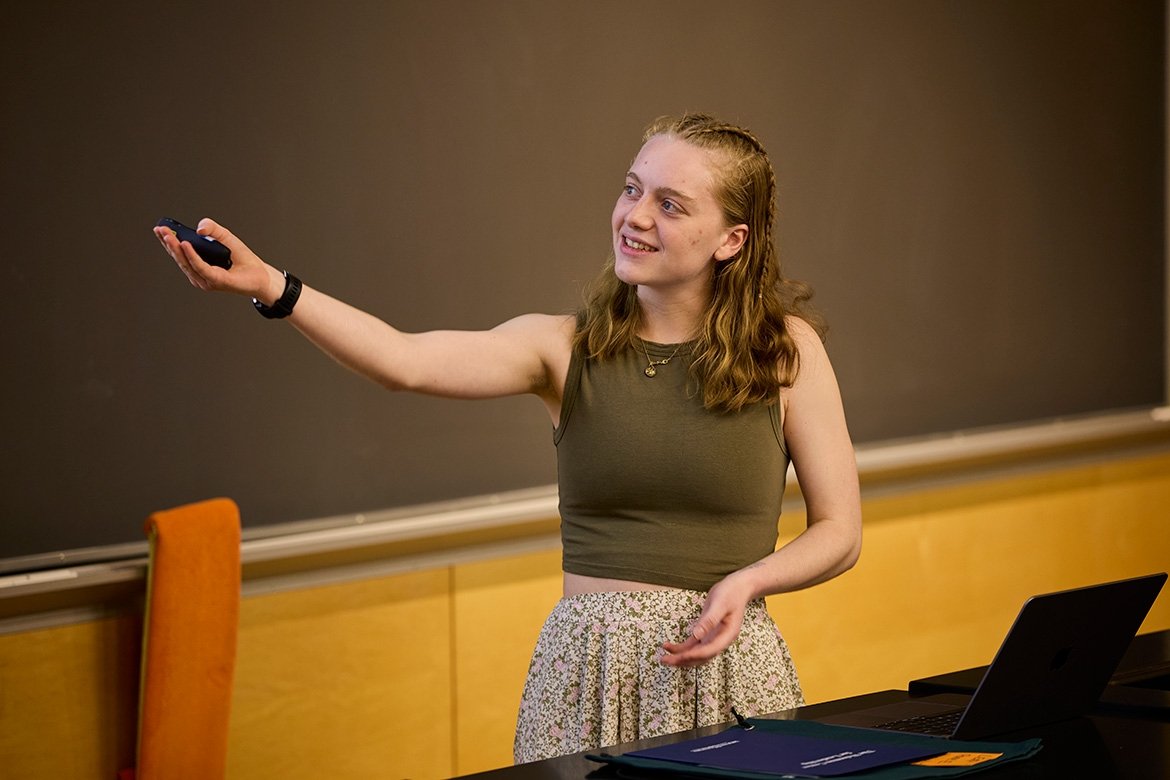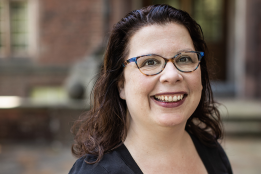Exploring student research at Senior Symposium

Mount Holyoke College’s annual Senior Symposium is one of the crowning achievements of a student’s intellectual journey.
Mount Holyoke College’s annual Senior Symposium gives members of the graduating class the opportunity to share the culmination of a year’s worth of independent research, 395-level coursework or other project work that demonstrates depth of research and analysis with friends, faculty, staff and family.
However, the event is more than a dizzying array of high-level research and intellectual passions; it is one of the crowning achievements of a student’s intellectual journey at MHC.
The Senior Symposium for 2025 featured research from across the campus and across disciplines. Students presented on topics as diverse as “The Genocide Convention and the Cosmopolitan Turn in International Law,” “The Architect as Choreographer: A Movement-Centered Approach to Designing Spaces,” “Dynamics of Adsorbed Polymer Layers in Three-Dimensional Media,” “Fiddling With Crabs: Experiments on Leptuca Pugilator and Minuca Pugnax Heat Tolerances” and “Optimizing Calibration Transfer for Laser-Induced Breakdown Spectroscopy (LIBS): A Multi-Instrument Study Across Atmospheric and Laser Power Variations.”
“This year we had close to 200 presenters at Senior Symposium in almost every discipline and interdisciplinary program — an all-time high,” said Amy E. Martin, director of the Weissman Center for Leadership, which organizes the annual event. “The desire of our seniors to present today signals the importance of senior capstone scholarship and artistic production as the culmination of a rigorous liberal arts education at Mount Holyoke. After attending a number of panels, I am deeply impressed by the expertise, brilliance, creativity and dedication of our students.”
Seniors shared their findings and their triumphs with packed audiences in classrooms and lecture halls across campus. Some even opened up about the bumps they experienced along the way.
“A cockroach ate my thesis,” lamented Elizabeth (Eli) Gerbi ’25. “Imagine walking into my advisor’s office and saying this!” She was presenting on the “Effects of Climate Change Factors on Hypericum Perforatum Presence in New England.” The plants that she kept in the Talcott Greenhouse had been eaten by a swarm of cockroaches. However, Gerbi’s advisor, Martha Hoopes, was encouraging and urged her to continue.
The Senior Symposium included presentation tracks for science and humanities research as well as Learning From Application (LEAP) panel discussions, where students reflected on what they had learned during their internships.
One LEAP panel explored the themes of empathy and interpersonal relationships across students’ experiences in the fields of law and policy. Moderated by President Danielle R. Holley, Erin Deffely ’26, Hailey Isabel MacMillan ’26 and Madeline Sant ’25 discussed their internships. Deffely spent the summer working at a public defender’s office in Connecticut. MacMillan worked as an intern at the Victim/Witness Assistance Unit at Northwestern District Attorney Dave Sullivan’s office in Northampton. Sant worked in immigration law at Khanbabai Immigration Law in North Easton.
All three students found their experiences fulfilling and plan to pursue careers in law. The internships also served as vehicles for self-discovery and helped the students envision how they want to shape their future career paths. Deffely, for example, will not be pursuing a role as a public defender.
“I understand the theoretical justification for [this work] is important and how everyone deserves representation, and I agree with that. But I don’t think this is something that I personally could do,” Deffely said.
“I am very strongly against [the] punitive nature of [our] system, especially with lower-level cases,” MacMillan said.
President Holley was pleased with the culmination of the students’ hands-on learning. “I always want to hear that the conclusion is they still want to go into law, right?” she said. “We need more outstanding lawyers like our three presenters. I’m really excited to hear that this was the conclusion for all three of you.”
Senior Symposium began as a project of the chemistry department. In 1975, it expanded to include all the sciences. In 2006, it was launched as an opportunity for all graduating seniors. Senior Symposium is supported in part by the Richard and Donna Taylor Endowment Fund, established by Jean Taylor ’66.
Emily Thurlow contributed to this story.














